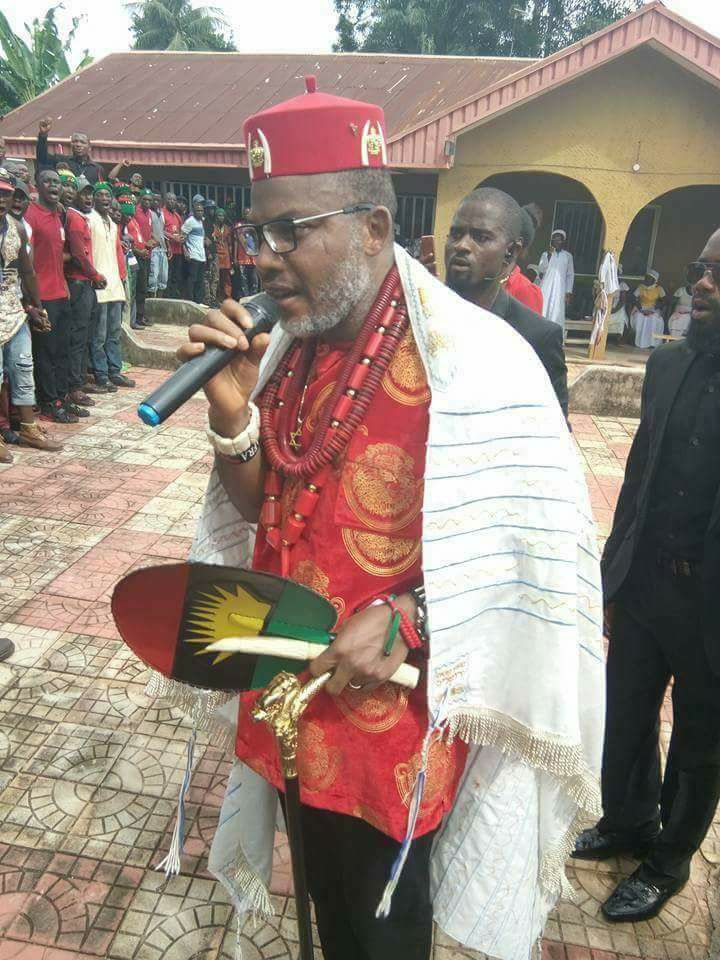Nnamdi Kanu: Saint or Megalomaniac

In 2017, Nigeria’s President Muhammadu Buhari spent 5 months in a London hospital treating undisclosed illnesses.
Shortly afterward, rumors began online that the president has died and was replaced by a clone.
The man who started those rumors was Nnamdi Kanu, a British-Nigerian political activist. He is also the leader of the separatist group; The Indigenous People of Biafra (IPOB), and director of London-based Radio Biafra.
The main aim of IPOB is to create an independent state of Biafra for the people of the old eastern region of Nigeria through the referendum.
To many Nigerians, Nnamdi Kanu is a trouble maker, while to those who believe in the Biafran dream, he is a hero and a leader. He is seen as almost a messianic figure; one chosen to lead the struggle to the Promised Land of Biafra.
To understand how one man can inspire thousands into giving their absolute devotion to his cause, we have to go back to the very beginning of the Nigerian state.
Bitter history
In 1914, the British amalgamated a number of their West African colonies largely for administrative conveniences.
Then in 1960, Nigeria became independent of the British, and as with many other new African states, the borders of the country did not reflect precolonial ethnic, cultural, religious, or political boundaries.
The northern region of the country has a Muslim majority. The southern population is predominantly Christian, primarily made up of territories of indigenous Yoruba and Biafra Kingdoms in the west and east respectively. Following independence, the country was demarcated primarily along ethnic lines.
In 1967, civil war broke out after Igbo military general and governor of the Eastern region Chukwemeka Ojukwu proclaimed independence from Nigeria and the creation of the Republic of Biafra.
It was a brutal war that lasted almost two and a half years, during which about two million Biafran civilians (most of them small children) died from starvation caused by the total blockade of the region by the Nigerian government.
Wrong political calculation
In February 2013, a new political party the All Progressives Congress (APC) was formed in anticipation of the 2015 general elections. The party was the result of a merger of the country’s three biggest opposition parties; the Action Congress of Nigeria ACN (popular in the west), the All Nigeria Peoples Party ANPP (popular in the north), the Congress for Progressive Change CPC (also popular in the north) and the new PDP, a faction of the then ruling People’s Democratic Party.
This new party and their candidate Muhammadu Buhari would go on to win the general elections defeating the then incumbent Goodluck Jonathan of PDP by53% to Jonathan’s 44% of votes cast.
The elections would underline an old divide in Nigeria’s politics.
See states in the south-east and south-south parts of the country that made up the old Biafra voted massively against the APC. This is the point at which Nnamdi Kanu entered politics.
In July 2015, reports began to emerge in the media that the frequencies of Radio Biafra have been jammed. Radio Biafra is an online radio station based in London and it is owned and operated by Nnamdi Kanu. On it, he shares his opinions on how a group of southern states of Nigeria should break away and form an independent state of Biafra. Kanu does not hide his tribalism, he often uses derogatory terms to describe other Nigerian tribes, and in fact, labeled the rest of the country a zoo.
Radio Biafra, the medium that brought Kanu to the limelight would also be his biggest undoing. Through deliberate and sustained seeding of incorrect information, once a week he addresses his followers, many of them spread in countries across the world. His claims are always aimed to support the Biafran narrative, even when those claims negate reality.
To Nnamdi Kanu, Nigeria is a failed state and the only solution is to dismember the country along ethnic and religious lines. But to other Igbos, Kanu is a megalomaniac using the history of Biafra to enrich himself.
Saint or megalomaniac, the Nigerian state has avoided answering questions about the civil war, and to many Kanu is the only person trying to find answers.
